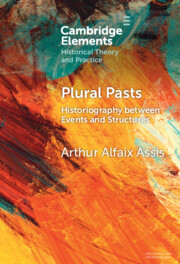Plural Pasts
Historiography between Events and Structures
Published online by Cambridge University Press:
04 December 2023
- Arthur Alfaix Assis
- Affiliation:
Universidade de Brasília
Summary
What is history about? This Element shows that answers centred on the keyword 'past events' are incomplete, even if they are not simply wrong. Interweaving theoretical and historical perspectives, it provides an abstract overview of the thematic plurality that characterizes contemporary academic historiography. The reflection on different sorts of pasts that can be at focus in historical research and writing encompasses events as well as non-events, especially recursive social structures and cultural webs. Some consequences of such plurality for discussions concerning historical methodology, explanation, exemplification, and representation are also outlined. The basic message, reinforced throughout, is that the great relevance of non-event-centred approaches should prompt us to talk more about “histories” in the plural and less about “history” in the singular.



